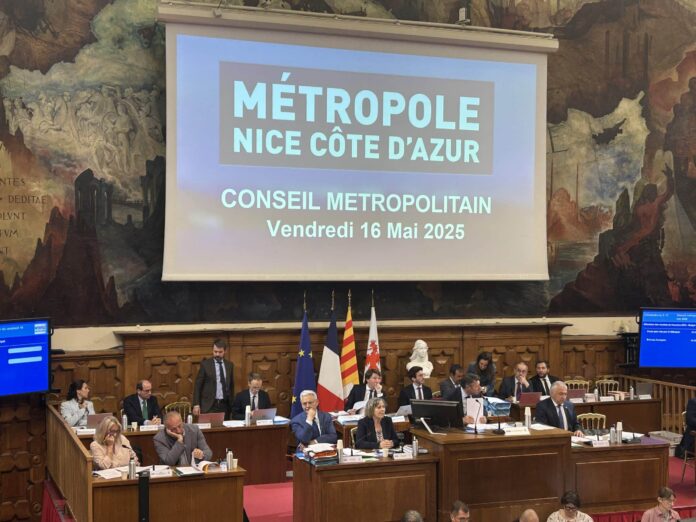Despite a constrained budgetary context, the Nice Côte d’Azur Metropolis (MNCA) presents its 2026 budgetary orientations marked by tax stability, a reduction in debt, and the continuation of investments in public services, ecological transition, and mobility.
In a plenary session of the Metropolitan Council, the Nice Côte d’Azur Metropolis (MNCA) presented its budgetary orientations for 2026 on Wednesday, October 22, 2025. This document, which precedes the initial budget, establishes the main financial and political guidelines for the upcoming year.
The national context remains tense for local governments. The draft finance bill for 2026 already clearly foresees a public account recovery effort that will impact the territories. For the Nice metropolis, the loss of revenue is estimated at nearly 11 million euros. “In the face of this pressure, our line remains clear: rigor, resilience, and responsibility to prepare for the future,” emphasized the president of the Nice Côte d’Azur Metropolis, Christian Estrosi.
Despite these constraints, the MNCA has affirmed its desire to preserve tax stability for households and businesses. No increases are planned on property tax, residence tax on secondary homes, garbage collection tax, or business property contribution.
Strong savings and continued debt reduction
The Metropolis anticipates gross savings of 154.5 million euros in 2026, which is an increase compared to 2025. This level reflects a management deemed rigorous and a control of operating expenses, especially in a context of rising mandatory charges.
Debt reduction continues: the debt service capacity, already improving since 2023, should reach 10.7 years by the end of 2026 as opposed to 11.1 by the end of 2025. The outstanding debt is expected to decrease by 41 million euros over the year.
This financial trajectory allows the Metropolis to continue its investments while maintaining the quality of public services. According to the metropolis’s report, the objective remains to ensure “rigorous financial management for a serene future, the continuity and efficiency of public services, and sustained investment policy.”
449 million euros in consolidated investments
In 2026, the Metropolis plans nearly 450 million euros in consolidated investments. The priorities are clearly identified: ecological transition, sustainable mobility, reconstruction of valleys affected by storms, innovation, and social cohesion.
In Nice, several structuring projects will continue to mark the territory. The extension of the T4 tramway lines and T5, the deployment of clean-engine buses, and the development of Lignes+ are among the mobility projects.
On the environmental front, the Metropolis is continuing to modernize the Haliotis 2 wastewater treatment plant, enhancing waste value with the Arianeo site, and implementing the new Climate Plan 2026–2032. The strategy of a “permeable city” and the development of renewable energies complete this axis.
Territorial resilience also remains a priority, with the continuation of reconstruction work in the valleys damaged by storms Alex and Aline.
Innovation and digital technology are not forgotten: experimentation with artificial intelligence, the development of urban hypervisors, and digital inclusion are among the planned actions.
Finally, the Metropolitan Solidarity Fund, amounting to 10 million euros, will be maintained to support the municipalities in the territory.
A contested report of fiscal stability
In response to the presentation of this report, the opposition manifested in the assembly. Juliette Chesnel-Le Roux first pointed out “a decrease in investments” of about 55 million euros between 2025 and 2026. The candidate from the Union of the Left for the 2026 Municipal elections also highlights the “colossal debt of 1.65 billion for the metropolis […] for oversized, short-lived, sometimes useless projects, for grandiose projects while our roads await renovations, the L4 and L5 tramway lines remain on the drawing board, our social housing awaits work, and residents await concrete solutions to their difficulties.”
The year 2026 promises to be a stage of consolidation, with a declining debt, increased savings, and investments focused on ecological transition and quality of life in the Nice territory.


